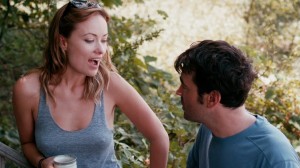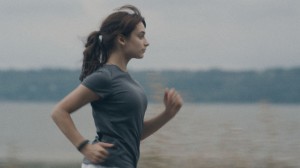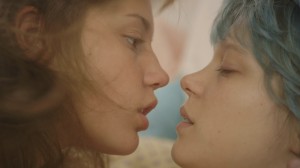I wrote this feature during fun work experience at Lionsgate. They were trusting enough to let me write a feature on maths films for them, as part of promotion for the fifteenth anniversary release of Darren Afonsky's 'Pi', so that was pretty cool. The screenshots of the movies are remarkably similar, the maths movie is a genre that has repeatedly tread across familiar terrain.
HEY, THERE’S A PATTERN HERE
A guide to cinematic mathematics
Films that revolve around numbers can usually be condensed into two types; the unstable genius movie and the maths thriller movie. We’re all familiar with the brilliant mathematical whizz manically jotting formulae on a blackboard. He’s (he is seldom a she) the one who is deeply damaged, socially inept or suffering from a severe mental illness. He solves something ground-breaking and influential, or simply shows his awe-inspiring skills. He is more often than not, working or studying at the Massachusetts Institute of Technology (MIT) in Boston, or has a disturbed parent that has studied there. He will not be a genius whilst being happy and stable, and if he has a mental illness minus some form of exceptional ability, he will probably be taken out of the equation.
The link between genius and mental disorder is one that has been hackneyed in films involving mathematics, and this could arguably be a critique of the genre. Regardless, many have been original and auspicious hits, worthy of celebration. To honour the fifteenth anniversary of 'Pi', the compelling debut feature from the prolific Darren Afonsky (Black Swan, Requiem For a Dream), in a definitive Blu-Ray package, we have taken a look at several films that feature numbers, including ones that do and don’t add up.
Rain Man (1988)
“Let’s play some cards.”
Callow Charlie Babbit (Tom Cruise) discovers his father has died and given his multi-million dollar estate to his other son, autistic savant Raymond Babbit, who Charlie was previously unaware of. The most memorable part of this Oscar winning film is the scene where Raymond (a wonderful Dustin Hoffman) counts the number of toothpicks that have fallen to the ground by just a glance. His photographic memory means he has memorised all numbers and addresses in the phone book, and he can work out complicated sums in his head. Although 'Rain Man' was a quality piece of film-making for its day and boasts a remarkable performance, it has clearly contributed to the notion that those with autism are generally gifted. This is a Hollywood, rose-tinted representation of one with the developmental disorder, and the most famous. The idea that autists are savants is one perpetuated by such constructions. The film has a positive reputation as a warming film, but from another perspective it is patronizing and assuming. Raymond is a nuisance to his brother Charlie until he discovers he can win him money in a casino.

Good Will Hunting (1997)
“My boy's wicked smart.”
Modern American classic 'Good Will Hunting' is perhaps the most iconic maths movie. This feel-good psychological drama, co-scripted by and starring childhood friends Matt Damon and Ben Affleck, earned them two Academy Awards and was actually successful when 'Titanic' was sinking most of its competition. Damon plays 20 year old Will Hunting, a working class maths genius who works as a janitor at MIT. He is discovered and nurtured by award-winning maths professor Gerard Lambeau after anonymously solving a complex equation on a blackboard. His self-destructive nature and disinterest in excelling leads him to psychiatrist Sean Maguire (Robin Williams). What made this such a hit is the charisma and understated performances from Williams and Damon, and how they effortlessly conveyed one of the most emotionally involving friendships in cinema without being irritatingly sentimental. The conventional narrative and lesson in self-improvement could have created a saccharine and overly idealistic result. Yet, Gus Van Sant’s ('Milk', 'Elephant') treatment of Wills growth is organically developed and paced, as is the spark between him and Harvard student Skylar (Minnie Driver). A quality piece of enjoyable mainstream fare that was always bigger than the sum of its parts.

The Cube (1997)
“I’m not dying in a fucking rat maze!”
Sharing the same math thriller sub-genre as 'Fermat’s Room' and 'Pi', The Cube is a gripping maths horror and the first in a series of three. The premise is a group of strangers who wake up in a cryptic structure with no knowledge of how or why they got there, an idea rather similar to the 'Saw' films. It won the 1997 Toronto Film Festival prize for ‘Best Canadian First Feature’. Quentin is the central protagonist, and along with six other unfortunate people, must use his ability to quickly work out how to get out of this maze of interlocking cubes, or they will all die from dehydration. There are traps set, as they soon discover when witnessing several gruesome outcomes. The acting is impressive considering the minimalist set, yet the dialogue and characters are a tad commonplace.
Pi (1998)
“Everything can be understood in terms of numbers.”
A striking debut feature from accomplished director Darren Aronofsky, ('Requiem for a Dream' and 'Black Swan.') 'Pi' proved his huge potential and his ability to portray madness in a riveting and original way. It focuses on Max Cohen (Sean Gullette, who helped the director and producer write the story), a haunted genius mathematician withdrawing from the world in the walls of his squalid NYC flat. He sees numbers everywhere and believes all matter in the universe can be explained mathematically. He is seeking out a pattern in man’s largest productions of ordered chaos: the stock market, and discovers a Hebrew number which may hold the name of God. Imminent discovery is interlinked with the loss of sanity, and the boundaries between psychosis and solved mystery become unclear. His pursuit leads to severe headaches, blackouts, hallucinations and tremors. Filmed using eery black and white cinematography and with a hypnotic, pulsing score, Pi is a successful vision of a paranoid nightmare.

A Beautiful Mind (2001)
“In competitive behaviour, someone always loses.”
Ron Howard’s rather syrupy and (highly) fictionalised biopic stars Russell Crowe as the real life mathematician John Forbes Nash. Nash did his revolutionary work on ‘game theory’ in his early twenties, and his schizophrenia cut his career short. The film condenses 50 years of Nash’s life into 135 minutes and focuses largely on his illness and his relationship with his devoted wife Alicia (Jennifer Connelly). It begins from his arrival at Princeton as a young arrogant maths graduate, and ends with him receiving the Nobel Prize aged 64 from an exuberant academic world. Paul Bettany shines as Nash’s quirky, alluring English roommate and Russell Crowe gives a solid but not staggering performance as a gibbering and nervy man losing his grip on reality. There is at least an attempt to explain his famous theory, albeit done so in a simplistic manner.
Proof (2005)
“Sometimes in my head I think it works, and then, sometimes I just think it’s crazy.”
One year after 'A Beautiful Mind' was released came this fair and familiar story told through the flashbacks of the central protagonist Catherine (Gwyneth Paltrow). Anthony Hopkins plays her recently deceased father, who was an immensely intelligent but mentally ill figure. Catherine has inherited his skill and potentially his mental state. Talented and charming maths geek Hal (Jake Gyllenhaal) is her love interest, and is after her father’s papers that may reveal a precious mathematical proof constructed in a rare moment of lucidity. Catherine insists the work is hers and must prove it, as well as affirm her sanity to the audience and to her sister. An emotional drama rather than a study of science, where Hopkins was criticized for his sketchy performance and many took to be a less than satisfactory alternative to the David Auburn’s Pulitzer Prize winning play that is is based on.
Moneyball (2011)
It’s about getting things down to one number. Using the stats the way we read them, we’ll find value in players that no one else can see.”
The stereotypical underdog tale was given a well-received, creative spin in this baseball statistics film that sports a rather incongruous yet winning cast of Brad Pitt, Philip Seymour Hoffman and Jonah Hill. The ins and outs of baseball is as alienating to British audiences as another language, but luckily 'Moneyball' is about the sport the same way that 'The Damned United' was about the specifics of football managing, and 'The Social Network' was about web development. Whilst the aforementioned films focused on the drama between the lead protagonists, 'Moneyball' centres on the working relationship between Oakland A's general manager Billy Beane (Pitt) and young, inexperienced Economist Peter Brand (Hill), who Beane hired to reconsider the team's game approach. It's based on the true story of how the Major League Baseball team upset the game’s odds in the 2001-2002 season, and using statistical models, placed together a team of misfits to compete. With a razor sharp script and a great performance from Pitt, 'Moneyball' is a fine example of high class Hollywood fare.

Fermat’s Room (2007)
“Do you know what prime numbers are? Because if you don’t, you should just leave now.”
Spain is an expert on the horror and thriller genre, as most film buffs will be aware, leading America to frequently imitate its exports. There’s Guillermo del Toro who gave us 'Julia’s Eyes', 'Pans Labryrinth' and produced 'The Orphanage'. Jaume Balagueró and Paco Plaza Ángela’s frankly terrifying highlight of the found footage genre, 'Rec', Almodovar when he decides to dabble in psychological thriller ('The Skin I Live In') and the list goes on. 'Fermat’s Room' is a Spanish thriller that doesn't quite compare to the brilliance of the former films, but is sleek and stylish nonetheless. Maths experts are trapped in a room that is closing in on them, and they must quickly work out arithmetical conundrums to stop the walls moving, as sent by their kidnapper. Oddly the scenario reminded this writer of Indiana Jones trapped in a closing room with spikes stuck out of the walls in 'The Temple of Doom', but it’s slightly less ridiculous.
Knowing (2009)
“The Numbers are key to everything.”
Another to add to Nicholas Cage’s increasingly questionable filmography, this Sci-Fi movie received a low critical reception. Cage plays an astrophysicist, at MIT of course, whose son Caleb derives some horrific news about the state of the Earth when his school discovers a time capsule from 1959. It includes a series of numbers written by a young girl named Cassandra, and their patterns are indications to widespread calamities, both in the past and future. Knowing is an overly ambitious merge of maths, science, religion, and disaster films. If someone added together Pi, Signs, Deep Impact, Final Destination and The Twilight Zone, plus more absurdity, the result might look roughly like this.
The Number 23 (2007)
“Twenty-f*cking-three!”
Jim Carrey has shown us how he can do drama just as well as comedy in 'Eternal Sunshine of The Spotless Mind', but unfortunately this film doesn’t reveal such talent. He plays the obsessive, once sane Walter Sparrow who becomes hooked on self-published book ‘The Number 23’ by Topsy Kretts, which reveals how the number has a mysterious and deadly presence. Kretts plays with a concept first outlined by William Burroughs, focusing on the numbers frequent occurrence in historical and cultural happenings. It is far from Jim Carrey’s finest hour. It isn’t entirely his fault, considering it was brought to us by Joel Schumacher. Granted, he directed the hit 'The Lost Boys', but he also directed Batman and Robin amongst other forgettable features.















